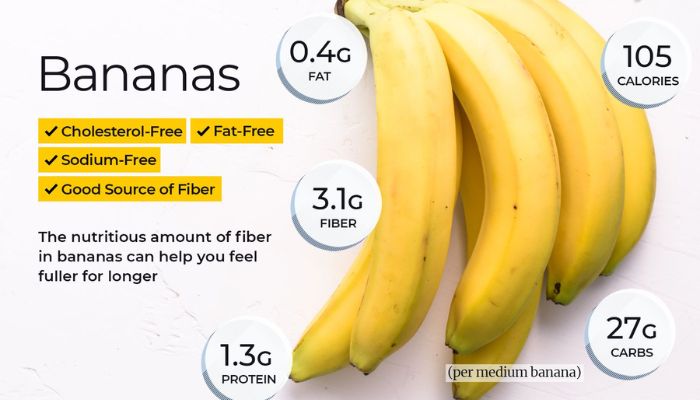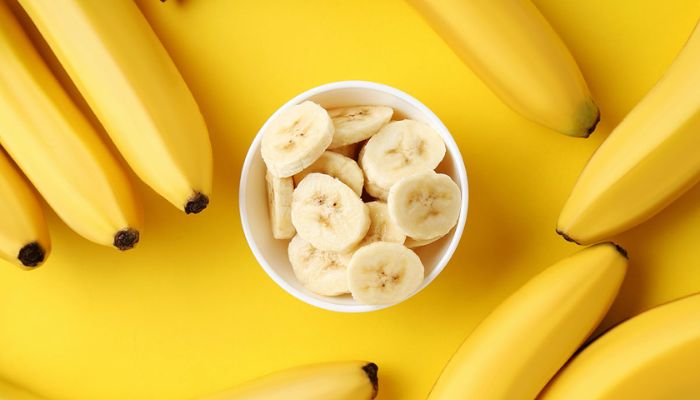As a nutritionist with over 7 years of experience, I am often asked about the calories in bananas and their health benefits. In this blog post, I will provide essential insights into banana calories and the myriad health benefits they offer. Read below about “Banana Calories Essential Insights and Health Benefits”.
Bananas are one of the most popular fruits around the world, thanks to their versatility, affordability and nutrition profile. But how many calories does a banana contain? Here are some key insights:
Calories in Different Sizes of Bananas
- A small banana (6 inches long) contains about 90 calories
- A medium-sized banana (7-8 inches long) contains 105 calories
- A large banana (9 inches or longer) packs 121 calories
So as you can see, bananas are relatively low in calories, with even a large banana containing just 121 calories.
Bananas offer nearly 30 vitamins and minerals, making them nutritionally dense. The calories come mainly from carbohydrates and a small amount of protein. Let’s look at the macronutrient breakdown:
- Carbohydrates: 27 grams per medium banana, accounting for most of the calories
- Protein: 1.3 grams
- Fat: 0.4 grams
With over a quarter of the recommended daily value of vitamin B6, bananas are especially rich in this nutrient which supports over 100 enzyme reactions in the body. They also contain 12% DV of potassium, an electrolyte that regulates blood pressure. The fiber content helps regulate digestion.
This optimal nutritional profile makes bananas a healthy choice in your daily diet. But how many bananas can you eat in a day? Let’s find out.
Recommended Number of Bananas Per Day
As a nutritionist, I recommend limiting banana intake to 2 medium bananas per day for most healthy adults. This adds up to about 210 calories and 54 grams of carbs.
Bananas are energy-dense with their high sugar content. Consuming more than 2 per day can quickly add excess calories. It’s best to pair bananas with a protein source like nut butter or Greek yogurt to help balance out the glycemic response.
Additionally, those with diabetes or weight management goals should limit intake to 1 banana daily or every other day. The high glycemic index of bananas can cause blood sugar spikes in some individuals. As always, moderation is key.
Top 7 Health Benefits of Bananas
Now that we’ve covered the basics of banana calories, let’s explore the top ways these nutritious fruits can benefit your health:
1. Improve Digestive Health
Bananas contain prebiotics, a type of fiber that feeds healthy gut bacteria. The resistant starch and pectin in bananas act as probiotics promoting regularity and a healthy microbiome. The antioxidant and anti-inflammatory properties also soothe the stomach lining.
2. Boost Heart Health
With 9% DV of potassium bananas help regulate blood pressure and offset sodium. The magnesium relaxes blood vessels preventing atherosclerosis and stroke risk. The fiber scrubs away arterial plaque as well.
3. Increase Immunity
The vitamin C, B6 and other antioxidants in bananas neutralize free radicals and strengthen immunity against infections.
4. Aid Weight Loss
The resistant starch and fiber promote satiety keeping you full for longer on fewer calories. Bananas are also metabolism-boosting.
5. Improve Nutrient Absorption
Bananas contain fructooligosaccharide (FOS) which improves the body’s ability to absorb nutrients like calcium for stronger bones.
6. Regulate Blood Sugar
Despite the sugar content, bananas have a low glycemic index of 51 when ripe. Unripe bananas are even safer for diabetics with a GI of 30.
7. Promote Kidney Health
The potassium helps regulate fluid balance and flush out toxins from the kidneys. Pectin removes heavy metals and waste from the blood filtering to the kidneys.
As you can see, bananas offer an array of benefits beyond just calories. They make for a very healthy addition to your diet in moderation.
How to Incorporate Bananas into Your Diet
Here are some of my top tips as a nutritionist for getting your daily dose of banana nutrition:
- Enjoy a banana smoothie for breakfast by blending milk, yogurt, peanut butter and a banana. It makes for a nutrient-dense meal to start your day.
- For a snack, slice a banana onto whole grain toast and top with almond butter. The healthy fats and fiber will keep you satisfied.
- Make banana ice cream by freezing chunks of banana and blending them up with cocoa powder and milk for a creamy, dairy-free treat.
- For post-workout recovery, blend a banana with your protein powder, ice and milk for a muscle-building shake.
- Bake oatmeal cookies, muffins or banana bread using mashed ripe bananas as a substitute for oil or eggs.
- Mix walnuts, banana slices and light honey mustard over salad greens for a nutritious lunch option.
Be sure to purchase bananas at varying stages of ripeness so they last longer. Store them on the counter away from sunlight until ripe. Once ripe, move to the fridge to slow spoilage. The peel will darken but the flesh will remain good for 3-5 days more.
The Takeaway on Banana Calories and Nutrition
I hope this article has helped shed light on how many calories in a banana as well as the multitude of vitamins, minerals and health benefits bananas can offer. Though bananas are energy-dense, the nutrition profile makes them an excellent addition to a balanced diet in moderation.
Aim for 1-2 medium bananas per day, and experiment with incorporating them into smoothies, baked goods, yogurt bowls and more. As a nutritionist, I often recommend bananas to clients due to the many benefits for digestion, immunity, heart health, weight management and beyond. So enjoy them as part of a varied diet and active lifestyle.

Pooja Bohra is a certified nutritionist with over 8 years of experience in the field. At UnderCalories.com, she specializes in creating personalized dietary plans and promoting sustainable health practices, grounded in evidence-based research. Pooja is dedicated to helping individuals achieve their wellness goals. Follow her on Instagram for the latest tips and insights on balanced nutrition and healthy living.

